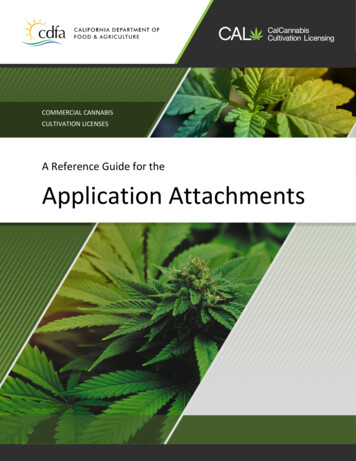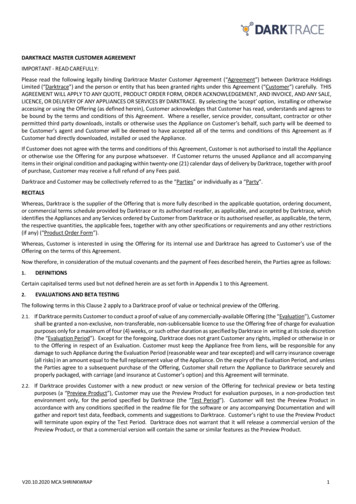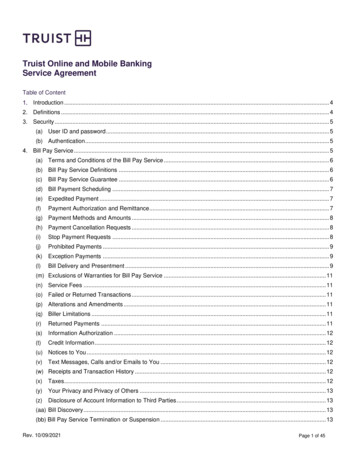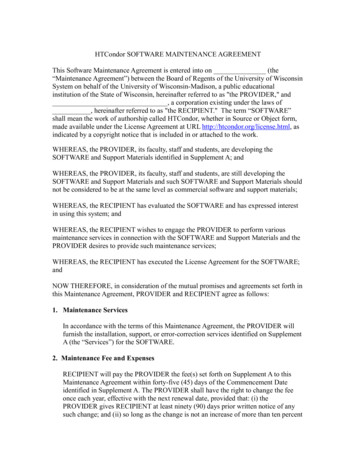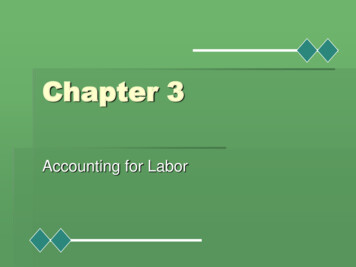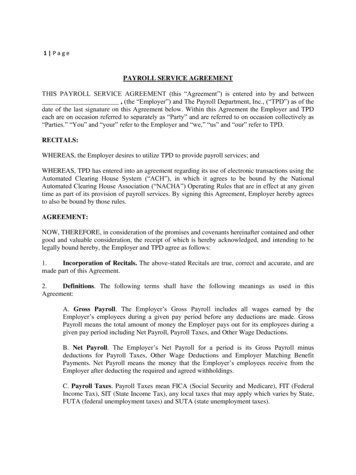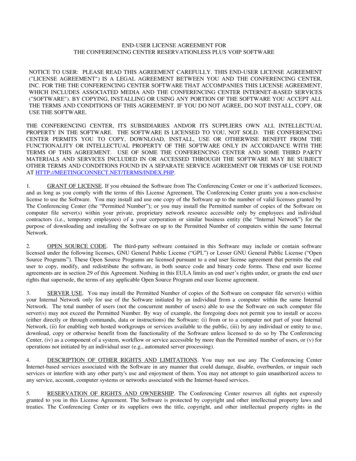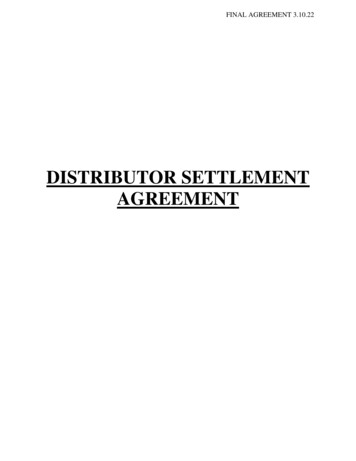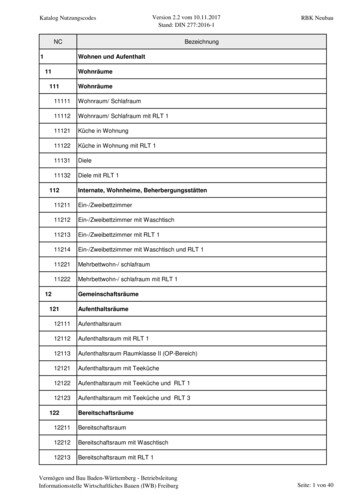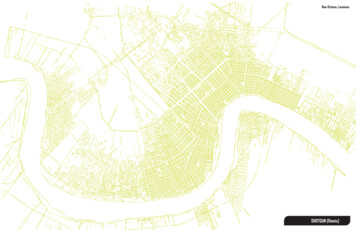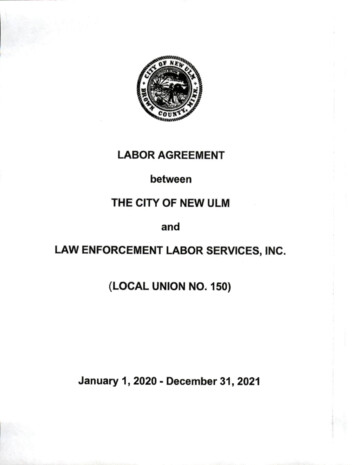
Transcription
LABOR AGREEMENTbetweenTHE CITY OF NEW ULMandLAW ENFORCEMENT LABOR SERVICES. INC.(LOCAL UNION NO. 150)January 1, 2020 - December 31, 2021
TABLE OF CONTENTSARTICLE:PREAMBLEPAGE:11. PURPOSE OF AGREEMENT2. DEFiNITIONS3. RECOGNITION4. UNIT SECURITY5. EMPLOYER SECURITY6. EMPLOYER AUTHORITY7. PROMOTIONS8. CANINE OFFICER9. PROBATION10. SALARIES11. DEFERRED COMPENSATION12. HOURS OF WORK13. RESIDENCE14. OUTSIDE EMPLOYMENT15. HOLIDAYS16. VACATIONS17. SICK LEAVE18. SEVERANCE PAY BENEFIT19. LEAVE OF ABSENCE20. GROUP INSURANCE21. BENEFITS FOR REGULAR PART-TIME EMPLOYEES22. TRAINING112222334566 889101012131523. UNIFORM MAINTENANCE24. LAYOFFS25. DISCIPLINARY ACTION26. GRIEVANCE PROCEDURE AND ARBITRATION27. LEGAL ASSISTANCE28. HEALTH CARE SAVINGS PLAN29. SAVINGS CLAUSE30. DURATION OF AGREEMENT1617171920212122APPENDIX "A"WAGES23APPENDIX "B"PRO-RATED VACATION SCALE24APPENDIX "C"GROUP MAJOR MEDICAL INSURANCE BENEFIT25
PREAMBLETHIS AGREEMENT, made and entered into this 20th day of December. 2019 by and betweenthe City of New Ulm, Minnesota hereinafter referred to as the EMPLOYER,and Law EnforcementLabor Services, Inc., hereinafter referred to as LELS.ARTICLE 1. PURPOSE OF AGREEMENT.1.1The intent and purpose of this Agreement Is to:1.1.1 Establish certain hours, wages and other conditions of employment; and1.1.2 Establish procedures for the resolution of disputes conceming the Interpretationand application of this Agreement.1.2The Employer and LELS, through this Agreement, continue their dedication to provide thehighest police protection to the citizens of New Ulm. Both parties recognize this Agreementas a pledge of this dedication.ARTICLE 2. DEFINITIONS.2.1REGULAR HOURLY RATE means the Employee's hourly rate exclusive of holiday pay,overtime pay and any other incremental compensation.2.2CITY COUNCIL means the Council of the City of New Ulm.2.3CITY MANAGER means the Manager of the City of New Ulm.2.4CH lEF means the Chief of the New Ulm Police Department.2.5COMMANDER means the Commander of the New Ulm Police Department.2.6EMERGENCY means a situation so defined by the Chief, or in the Chiefs absence, theCommander.2.7EMPLOYEE means a member of the formally recognized bargaining unit.2.8GRIEVANCE means a dispute or disagreement raised by an Employee against theEmployer involving the interpretation or application of the specific provisions of thisAgreement.2.9MASTER SENIORITY is defined as the total length of continuous employment as a fulltime licensed police officer by the City of New Ulm.2.10 JOB CLASSIFICATION SENIORITY is defined as the length of most recent continuousservice in the Employee's current Job classification. An Employee shall have no Job
classification seniority until completion of the probationary period in the job ciassification;however, upon attaining non-probationary status, the Employee's job classificationseniority shall relate back to the date of appointment to include the probationary period.ARTICLES. RECOGNITION.3.1The Employer recognizes LELS as the exclusive representative for full-time Employees ofthe New Ulm Police Department as defined in M.S.A. §179A.03 Subd. 8 for the followingjob classifications:SergeantsCorporalsSenior InvestigatorInvestigatorPolice Officers - First ClassPolice Officers - Second ClassPolice Officers - Third ClassARTICLE 4. UNIT SECURITY.4.1In recognition of LELS as the exclusive representative, the Employer shall:4.1.1 Deduct each month an amount sufficient to provide the payment of duesestablished by LELS from the wages of all Employees authorizing In vwlting suchdeductions;4.1.2 Remit such deductions to the appropriate designated officer of LELS; and4.1.3 Submit a list of names to LELS of those Employees from whom such deductionsare made.ARTICLE 5. EMPLOYER SECURITY.5.1LELS agrees that during the life of the Agreement, it will not cause, encourage, participateIn or support any strike, slowdown, or other inteiruption of or interference with the normalfunctions of the Employer.ARTICLE 6. EMPLOYER AUTHORITY.0.1LELS recognizes and acknowledges the prerogative of the Employer, as defined in M.S.A.179A.03 Subd. 15, to operate and manage its affairs in ail respects In accordance wkhapplicable laws and regulations of appropriate authorities. The prerogatives and authoritywhich the Employer has not ofRciaily abridged, delegated, or modified by this Agreementare retained by the Employer.
ARTICLE 7. PROMOTIONS.7.1REGULAR APPOINTMENTS. Newly hired police officers without prior law enforcementexperience shall start their probationary period classified as Police Officer - Third Class.The Employer has the option to classify newly appointed officers with prior lawenforcement experience at any classification up to Police Officer - Second Class A Ratecommensurate with their prior law enforcement experience. All such officers may bereclassified to higher classifications during their first five years of employment subject tothe approval of the Chief of Police and the City Manager.7.2ADDITIONAL PROMOTIONS. Within sixty (60) days of a vacancy in the position ofSergeant, investigator, Senior Investigator or Corporal, the Employer will post notice ofsuch vacancy on a bulletin board in the Police Department. Such posting will occur at leastone week prior to filling any such vacancy, but the posting of such notice does not obligatethe Employer to fill the vacancy. Promotions shall be made by the Employer on the basisof Individual merit, work performance, written and/or oral examination, master seniority,arxJ prior law enforcement experience. All promotions shall be made on a three month trialbasis with the Employer making the sole determination as to whether or not the promotionis reclassified to a "Regular" status. Employees have the right to retum to their originalposition within three months of promotion without prejudice.Notwithstanding other provisions In this Agreement concerning promotions and/ortransfers of employees within this bargaining unit, Employer may transfer a qualifiedcurrent employee of the City of New Ulm or the New Uim Public Utilities into a vacantposition covered by this Agreement, without the requirement of posting notice of suchvacancy, if such a transfer is deemed by the Employer to be an appropriate "reasonableaccommodation" for a disabled employee under the requirements of the Americans withDisabilities Act or other applicable law.7.3PROMOTIONAL ELIGIBILITY AND RECLASSIFICATION. Police Officers must have aminimum of thirty(30)consecutive months of departmental service to qualify for promotionto the position of Corporal; thirty-six (36) months forjnvestlgator and fbrty (40) months forSergeant and Senior investigator.ARTICLES. CANINE OFFICER.8.1The Employee who Is assigned by the Chief of Police to the duties of Canine Officer shall,as part of that assignment, provide cane for the dog. including feeding, grooming,exercising, veterinary care, and maintenance of pen or other living space for the dog.Reasonable out-of-pocket expenses incurred by the Canine Officer for food or veterinarycare shall be reimbursed by Employer.
8.2The Canine Officer will receive thirty (30) minutes normally at the end of each scheduledshift for the dog's routine care and maintenance.(Example: A 10 hour shift will be reducedto a 9 4 hour duty shift with the remaining Vi. hour for dally maintenance/upkeep of thedog.)8.3The Canine Officer shall be paid an additional one-half hour at the overtime rate for theroutine care and maintenance of the dog on each of the officer's days off. The servicesprovided are for dog care and differ from the Officer's law enforcement duties andresponsibilities. The Canine Officer will receive compensation at the rate of 28.00 perhour for the care provided to the dog on the Officer's days off.8.4One shift per month can be used exclusively for training purposes. Additional trainingtimes are to be scheduled and authorized by the Chief or Commander, if formal trainingcannot occur during the Canine Officer's regularly scheduled shift, the Canine Officer willbe compensated pursuant to the provisions of Article 22 of this Agreement.8.5When the dog is out of the care of the Canine Officer, the above items do not apply.8.6Call-out time for the Canine Officer will be compensated at the call-back rate as defined inArticle 12.9 of this Agreement8.7Due to the nature of the Canine Officer's duties, scheduling changes may be necessary.These scheduling changes will be accomplished on an as needed basis by the Chief ofPolice.ARTICLE 9. PROBATION.9.1All Employees shall serve a probationary period of two thousand eighty (2080) hoursworked (excluding overtime) after hire.9.2During the probationary period, the Employer shall have the exclusive right to dismiss,discharge, layoff, or otherwise separate the probationary Employee from employment; andin such case, LELS and the Employee agree to take no action to prevent or delay suchseparation.9.3Except as otherwise provided in Article 25, the Employer shall retain the right to disciplineprobationary employees at Its discretion, and the Union and/or its members shall have noright to grieve or demand a hearing upon any disciplinary action taken againstprobationary employees.
9.4Vacation accrual shall begin at the commencement of employment, but accrued vacationmay be used only after completion of the first one thousand forty (1040) hours worked ofthe initial probationary period.9.5Employees shall accrue sick leave during their probation period under section 9.1. Sickleave used during an Employee's initial probation period is subject to doctor's verificationat the Employer's request. All sick leave used during an Employee's initial probation periodis subject to approval of the Chief of Police, or, In the Chiefs absence,the Commander.ARTICLE 10. SALARIES.10.1 The salary and wage plan shall include rates of pay for each position classification, asindicated in Appendix "A" to this Agreement. All wages paid to an Employee are subject toapplicable federal and state tax, other withholding required by law ordeductions authorized by the Employee.10.2 BASE PAY is the hourly rate of pay for each job classification as provided for inAppendix A.10.3 Effective January 1, 2015 DUTY ALLOWANCE will become a part of regular pay. Fulltime officers shall receive an additional .50 per hour as part of the employee's BasePay in Appendix A. The addltlona! .50 per hour being added to Base Pay is additionalcompensation; is being paid in lieu of a separate Duty Albwance; and is being paid forthe following:10.3.1 For hazardous duty, twenty-four hour call, off duty Inconveniences, basic andspecial police training, extra and Incidental uncompensated time; and10.3.2 For scheduled shift work including Sunday, holiday, night shifts and eveningassignments.10.4 HOLIDAY PAY is determined by the Employee's Base Pay and may be taken In lieu oftime-off for a recognized holiday.10.5 TRAINING PAY is not a part of Base Pay and shall be paid to Employees pursuant toArticle 22, Section 22.4; and1067OVERTIME PAY is not a part of Base Pay and Is paid for hours worked In excess of anEmployee's regularly scheduled work day, as defined in Section 12.2, at a time and a haifhourly rate.10.7 FTO PAY is additional pay provided to an Employee assigned the duty of a FTO (FieldTraining Officer)for each hour an Empbyee acts In this capacity(see Appendix A).
10.8 SOCIAL MEDIA PAY is additional pay provided to an Employee assigned the duty ofadministrating the Department's social media accounts(see Appendix A).ARTICLE 11. DEFERRED COMPENSATION.11.1 Through the term of this Agreement, the Employer will match 25% of the Employee's first 1,800.00 contributed during each calendar year to an Employer sponsored deferredcompensation plan established under Section 457 of the IRS Code. The maximumEmployer contribution shall be 450.00.ARTICLE 12. HOURS OF WORK.12.1 The work week for Employees will be determined by a schedule posted by the Chief ofPolice. Because of the requirements of providing continuous police protection for the City,Employees' work schedules may contain more or less than forty (40) working hours in acalendar week. Over a period of four(4) calendar weeks, however, a full-time Employee'swork schedule will average forty (40) compensated hours per calendar week (Includingvacation, holidays, and other compensated hours in addition to regular work houre), unlessthe Employee has arranged for unpaid leave pursuant to section 19.1.12.2 The regular work day for Employees may consist of either an eight, nine or ten hourschedule. These hours shall be predetermined by a schedule determined and posted bythe Chief of Police, or in the Chiefs absence, the Commander. The regular work daywill consist of consecutive hours of assigned duty and intervening time off for meals andcoffee breaks.12.3 The assignment of an Employee's job shift and job responsibility, shall be determined bythe Chief of Police, or, In the Chiefs absence, the Commander.12.4 Employees shall not change or trade scheduled hours of work, vacations, holidays, ordays off except with the approval of the Chief of Police, or, In the Chiefs absence, theCommander.12.5 OVERTIME DEFINED. Except for days-off overtime compensation paid to the CanineOfficer as described in Article 8.3 above, which is to be based upon the rate specifiedtherein, all work performed in excess of a full-time Employee's scheduled hours of work(as provided in Section 12.1) shall be considered overtime, and shall be compensated atone and one-half (1 14) times the Employee's regular rate of pay. unless compensatorytime as provided In section 12.6 is requested by the Employee.12.6 COMPENSATORY TIME. Employees shall not be required to take time off for overtimework, hereafter called "compensatory time". Compensatory time, if requested by theEmployee, will be eamed at the rate of one and one-half(1 14) hours of compensatory timefor each overtime hour worked. Employees are allowed to accumulate compensatory timehours to a maximum of 60 hours.
The use of compensatory time is subject to the approval of the Chief of Police, or, in theChiefs absence, the Commander.12.7 An Employee shall have the right to refuse an overtime assignment, unless the Chiefdetenmines that the public welfare necessitates such assignment, and in such cases, theovertime assignment shall be mandatory and not discretionary.12.8 The Employer agrees to divide all overtime work as equally as possible in the same jobclassification.12.9 COURT TIME/CALL BACK TIME. Employees shall be compensated a minimum of two(2)hours overtime pay when called back to work or for a scheduled court appearance afterhaving been released from the regular day's work. When an Employee is directed by theChief of Police to return to the Police Department to sign a complaint, s/he shall receivetwo(2) hours of overtime pay. in the event a scheduled court appearance is canceled withless than a twenty-four (24) hour notice to the involved Employee, that Employee shallreceive two(2)hours of overtime pay.12.9.1 Any Employee reporting for work on orders of the Employer and not beingassigned, shall be allowed two(2)hours overtime pay for so reporting.12.10 DAYLIGHT SAVINGS TIME. Employees who work during the daylight savings time Springclock adjustment will be required to record actual hours worked on their time sheet andthus be docked one hour of pay for working a shortened shift, or the Employee may submitone (1) hour of vacation or compensatory time to account for the one (1) hour lost in thetime adjustment. Employees who work during the daylight savings time Fall clockadjustment will receive one(1) hour of overtime pay for the additional one (1) hour workedIn excess of their normal assigned shift.ARTICLE 13. RESIDENCE.13.1Because of the nature of Police Employee's duties, LELS agrees that all Employees,within six (6) months from beginning date of employment, must take residence at alocation which wilt allow the Employee to reach the Law Enforcement Center within 30minutes, irrespective of weather conditions.ARTICLE 14. OUTSIDE EMPLOYMENT.14.1 Employees may assume other part-time employment If it does not adversely affect, orothenwise Interfere \with the performance and reputation of the New Ulm PoliceDepartment. Employees, contemplating such outside employment, shall advise the Chiefof Police of their Intent and secure the Chief of Police's approval if the other employmentregularly averages more than 20 hours per week.
ARTICLE 15. HOLIDAYS.15.1 The following eleven(11)designated days shall be recognized as paid holidays:New Year's DayIndependence DayMartin Luther King DayPresidents DayGood FridayMemorial DayLabor DayVeteran's DayThanksgiving DayChristmas Eve DayChristmas Dayin addition to these, each Employee shall also have one floating holiday (8 hours) to beused in the same manner as is vacation ieave.15.2 Full-time Employees who are required to work on a designated holiday shall receiveeight hours' pay at their normal hourly rate or eight (8) hours of compensatory time off,and shall also receive either payment at one and one-haif times their normal hourly rate,or compensatory time at one and one-haif hours for each hour worked, to be taken at atime acceptable to the Chief of Police. In the event that an Employee's scheduled shiftis partially on a designated holiday and partially on a day other than a holiday, theadditional pay or compensatory time shall be calculated only for the time worked on theholiday, not for the entire work shift.15.3 When a holiday falls on a regular shift worker's day off, such Employee shall receive anadditional eight hours of regular pay or eight(8) hours of compensatory time off.15.4 Any Employee not assigned to work on a designated Holiday, who reports to work onorders of the Employer and not being assigned, shall be allowed two hours double timepay for so reporting; and15.5 Employees shall receive double time pay for all overtime work performed on a designatedHoliday.ARTICLE 16. VACATIONS.16.1 Employees covered by this Agreement shall be entitled to vacattons with regular paycalculated on the basis of an individual Employee's years of continuous full-timeempioyment with Uie City of New Dim (or the New Ulm Public Utilities Commission).Except as provided in Section 16.1.1, an Employee may accrue vacation totaling no morethan one hundred ten percent(110%)of the Employee's annual vacation accrual. Vacationtime shall be accrued bi-weekly and the amount accrued and the maximum accrual limitare specified in Appendix "B".16.1.1 An Employee's annual vacation accrual may exceed one hundred ten percent(110%)only in extenuating circumstances. In such an event, a written request must
be made through the Chief of Police to the City Manager, whose approval isrequired for all such requests.16.2 The vacation schedule shall be posted no later than January 15 of each year, and will bebinding for that year except where an individual's request for a changed vacation period isapproved by the Chief of Police. In cases of conflict in requested vacation dates, theemployee with the most master seniority shall have priority over the other.16.2.1 Vacation requested by an Employee not subject to the provisions of Section 16.2may be taken in increments of not less than one-half(1/2) hour when authorized bythe Chief of Police, or in the Chiefs absence the Commander.16.3 Probationary Employees shall accrue vacation subject to the limitations set forth in section9.4.ARTICLE 17. SICK LEAVE.17.1Regular full-time Employees shall accumulate regular sick leave at the rate of eight (8)hours per month to a maximum of 960 hours. Upon maximum accumulation of regular sickleave, the Employee may continue to accumulate up to 720 Supplemental Sick Leavehours. Supplementai Sick Leave hours shail not be counted in the calculation of severancebenefits and can be used only by the employee who has accumulated the SupplementalSick Leave hours.Sick leave usage shall be deducted from the employee's accumulated regular sick leavehours, unless an Employee's sick leave exceeds 40 consecutive hours, in that event, sickleave usage for the 41 ' and subsequent consecutive hours shall be deducted from theEmployee's accumulated supplemental sick leave hours, if any. If an Employee does nothave accumulated supplemental sick leave hours, or if such hours are exhausted by thisprovision, sick leave usage for subsequent hours of sick leave shall be deducted fromaccumulated regular sick leave hours.17.2 Part-time Employees do not qualify for sick leave.17.3 Approval for sick leave of three (3) or more consecutive work shifts Is subject to doctor'sverification at the request of the Employer. The abuse of sick leave is strictly forbidden,and the Employer reserves the right to make such Investigation or check that may benecessary to determine that the privilege is not being abused.17.4 Sick leave may be used to supplement payments made under Workers' CompensationLaw so that the total of the Workers' Compensation payment and the sick leave paymentwill not be in excess of the total full time pay of such Employee. If the Employee elects touse accumulated sick leave to supplement Workers' Compensation payments, such sickleave shall be deducted on an hourly basis and any fraction of an hour of sick leave soexpended shall be considered as a whole hour over the tenn of the recuperation period.
17.5 Sick leave may be used when the Employee is absent due to an accident occurring whenoff-duty.17.6 Subject to the Employer's approval, sick leave may be used when an Employee'spresence Is required at home or in the hospital by reason of serious Illness or injury of amember of Employee's family or household. If requested by the Employer, the Employeeshall provide a doctor's verification of the illness or injury which Is the basis for the use ofsuch sick leave; if the ill or injured person Is someone other than Employee's spouse,child, or parent, the Employee shall provide a doctor's verification that the Employee'spresence is necessary to assist In the care of the ill or injured person. Use of sick leaveunder this subparagraph will normally be limited to three consecutive days. Such sickleave shall not be granted merely to permit an Employee to care for well children or toperform household duties. Where applicable, this section shall not be applied morerestrictively than the provisions of the Family Medical Leave Act. The Employer shall allowemployees to take paid sick leave in conformity with State and Federal law.ARTICLE 18. SEVERANCE PAY BENEFIT.18.1 The Employer shall provide severance pay benefits to any Employee leaving Cityemployment in good standing. The term "leaving employment in good standing" shall bedefined as a voluntary retirement or resignation when no disciplinary proceedings arepending against the Employee and the Employee is not under suspension or other writtensanction as a result of disciplinary proceedings under Article 25. The severance paybenefit shall be a percentage of the current value of the Employee's accumulated sickleave existent at the time of leaving City employment. The percentage awarded shall bebased on the annual number of sick leave hours taken by the Employee while employedb y the City In accordance with the following formula:Annual Average NumberPercentage of Accumulated Sick Leaveof Sick Leave Hours Used0-2424.1-36Value Provided as Severance Pay25%20%36.1-4815%48 10%18.2 Upon termination of employment, the two highest years of sick leave usage for thoseEmployees with at least three years of Master Seniority will be deleted from the total hoursused. The resultant annual average number of sick leave hours used will determine theEmployee's final severance benefit.ARTICLE 19.LEAVE OF ABSENCE.19.1LEAVE WITHOUT PAY. Leave of absence without pay may be granted by the CityManager when requested by an Employee if the City Manager deems such a request is10
justified. The City Manager shall establish a time limit when approving any Employeerequest for a leave of absence without pay.19.2 FUNERAL LEAVE. Up to three days of leave of absence with pay may be taken toarrange and attend funerals of members of an Employee's immediate family. Theimmediate family shall be construed to mean father, mother, spouse, brother, sister,father-in-law, mother-in-law, children, step-children, step-mother, step-father, stepbrother or step-sister of the Employee. One day leave of absence with pay may betaken to arrange and attend the funerals of an Employee's grandparent or grandchild.Sick leave, not to exceed four (4) hours, may be used to attend the funeral of a closefriend or a family member who Is not considered part of the Employee's Immediatefamily. Such leave is to be requested in advance and Is subject to the approval of theChief of Police.19.3 PREGNANCY AND PARENTAL LEAVE. The Employer will grant Pregnancy andParental Leave in accordance with State and Federal regulations. In addition toadherence to requirements of applicable State or Federal law ail Employees shall begranted one day of leave of absence with pay upon the arrival of their natural bom oradopted child.19.4 MILITARY LEAVE. Employees who are members of the National Guard or any branchof the Federal Reserves shall be entitled to leave for duty as provided by State law andshall be paid their regular salary during that period by the Employer. Where the numberof Employees allowed on vacation at any one time must be limited, military service inaccordance with State law will receive preference over vacations.Military service in accordance with State law will not affect an Employee's vacation orholidays.Military leave will be granted to an Employee who voluntarily or involuntarily enters Intothe military service of the United States during the time of War or declared NationalEmergency. Such leave shall be without pay and shall be for the duration of the War orNational Emergency. Employees entering Into military services shall file a request withthe City Manager who shall note the same on the Employee's personnel record.Following completion of military service, the Employee shall be entitled to be reinstatedin the position the Employee vacated or any equivalent position provided the Employeeshall file a request to do so with the City Manager within the period proscribed by lawfollowing such completion of military service.19.5 JURY DUTY. When an Employee has been absent from work because of jury service,the Employee shall be paid at the Employee's regular salary rate by the Employer withthe understanding that, at the completion of the jury service, the Employee shall presentthe check received for such jury service to the Employer and that the amount of suchcheck, (ess the amount Included for traveling expenses, shall be retained by theEmployer.11
ARTICLE 20. GROUP INSURANCE.20.1 The Employer agrees to purchase a basic group major medical insurance plan(Appendix "C"), for Employees covered under this Agreement, at the same benefitlevels as provided to other eligible City employees. The Employer will pay 100% of thegroup major medical insurance plan premium cost of the Basic Plan for single coverageand 80% of the premium cost of the Basic Plan for family coverage. The cost of familycoverage in excess of the Employer contribution will be the responsibility of theEmployee. Employees on unpaid leave in excess of thirty (30) days, who elect to retaingroup health insurance coverage, are responsible for the entire premium and paymentthereof, unless the Employer Is required by law to continue payment of its portion of thepremium.During the term of this Agreement, each full-time Employee shall be provided groupterm life insurance coverage in the amount of 50,000,00, subject to the provisions ofthe policy's benefits reduction schedule.20.2 The Employee contribution for Insurance coverage, as provided In Section 20.1, will bemade via payroll deduction. If, for any pay period, there are insufficient wages due andpayable to the Employee to cover the premium to be withheld, the Employee shallsubmit directly to the Employer, not later than the Employee's normal payday, theamount of premium owed by the Employee. If, during the term of this Agreement, thepremiums for such group major medical Insurance are changed, the Employer andEmployee shall continue their same pro rata share of premium cost.20.3 The Employer also agrees to offer the choice of a health savings account (HSA)qualified plan. The Employer's contributions to any group major medical insurancepremium and the HSA collectively will be equal to the Employer contribution to the BasicPlan referenced in Appendix "C". Because a health plan's eligibility is determined bythe IRS, the Employer's plan may be modified to maintain HSA qualified status.Additionally, HSA contributions shall be subject to maximums as established by the IRSeach year and will not exceed those annual amounts.20.4 In the event the health insurance provisions of this Agreement, as provided andimplemented, fail to meet the requirements of federal or state law, or applicableregulations, or cause the Employer to be subject to a penalty, tax or fine, theUnion and the Employer will meet immediately to bargain over alternativeprovisions so as to comply with the applicable statutes, regulations, or otherlaws, and avoid any penalties, taxes or fines to the Employer. In the event thatthe parties have not agreed to alternative provisions within the time framerequired for compliance, the Employer may make the required modificationspending an agreement between the parties.12
ARTICLE 21. BENEFITS FOR REGULAR PART-TIME EMPLOYEES21.1The provisions of the benefit program, as set forth herein, shall apply to personsemployed by the City of New Ulm in the classification of part-time Police Officer.The City of New Ulm stipulates, that for the purposes of the benefit extension program:th
2.2 CITY COUNCIL means the Council of the City of New Ulm. 2.3 CITY MANAGER means the Manager of the City of New Ulm. 2.4 CH lEF means the Chief of the New Ulm Police Department. 2.5 COMMANDER means the Commander of the New Ulm Police Department. 2.6 EMERGENCY means a situation so defined by the Chief, or in the Chiefs absence, the Commander.

